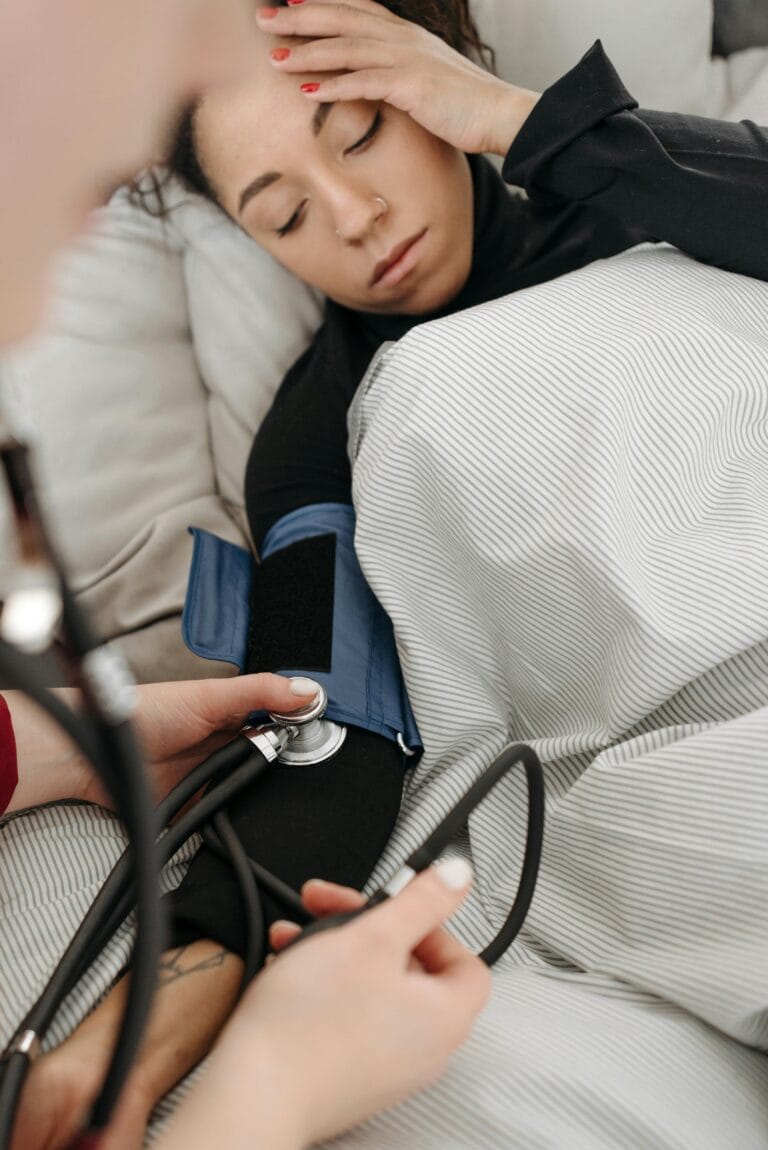FREE SHIPPING OVER $50
Can’t Sleep? These 10 Natural Alternatives to Melatonin Actually Work

You know the feeling: the lights are off, you’re nestled in your bed, but your mind is racing. You toss and turn, watching the clock tick from 1:00 AM to 2:00 AM to 3:00 AM. In the morning, you’re exhausted, groggy, and already dreading the night ahead. For many of us, this is an all-too-common cycle. The go-to solution for millions has been melatonin, a seemingly harmless over-the-counter supplement that promises to help you fall asleep.
But here’s the thing: for a lot of people, melatonin doesn’t work as advertised. It can lead to grogginess, strange dreams, or simply fail to make a difference at all. The truth is, while melatonin can be useful in specific situations, it’s not a magic bullet for all sleep problems. It’s a hormone, not a sedative, and our bodies are complex.
The Problem with Melatonin: Why You Might Need Alternatives
To understand why other options might be better for you, it’s helpful to understand what melatonin actually does. Your body naturally produces melatonin in response to darkness, signaling to your brain that it’s time to sleep. It’s a powerful regulator of your body’s internal clock, or circadian rhythm.
The issue is that for many common forms of insomnia, the problem isn’t a lack of melatonin. It’s often related to anxiety, stress, muscle tension, or poor sleep habits. Taking a dose of melatonin doesn’t address these underlying issues, which is why it can be ineffective. In some cases, taking too much can even disrupt your natural sleep cycle, making it harder to fall asleep without it.
Thankfully, many of these other natural vitamins and supplements work on these root causes, offering a more holistic and sustainable solution to your sleep problems.
10 Natural Alternatives That Can Actually Help You Sleep
Here are ten powerful natural sleep aids that work in a variety of ways to calm your body and mind.
1. Magnesium
This is arguably one of the most effective and widely-recommended supplements for sleep. Magnesium is an essential mineral that plays a key role in over 300 biochemical reactions in your body, many of which are directly related to sleep. It helps to calm your nervous system, regulate neurotransmitters that promote sleep, and acts as a natural muscle relaxant. Many people who struggle with sleep also have a magnesium deficiency.
- How to use it: Take a magnesium supplement 30-60 minutes before bed. Look for forms like magnesium glycinate, which is highly bioavailable and less likely to cause digestive issues than other forms like magnesium oxide.
2. Valerian Root
Often called “nature’s tranquilizer,” valerian root has been used as a sleep aid for centuries. It contains compounds that interact with a neurotransmitter in your brain called GABA, which helps regulate nerve impulses and calm anxiety. Its mild sedative properties can help you fall asleep faster and improve the overall quality of your sleep.
- How to use it: Valerian root is most commonly consumed as a tea or a supplement in capsule form. It can have a strong, earthy smell, so capsules might be a more palatable option for some.
3. Chamomile
You’ve likely already heard of chamomile tea for its calming effects, and there’s good science behind it. This popular herb contains an antioxidant called apigenin, which binds to specific receptors in your brain that can decrease anxiety and initiate sleep. A warm cup of chamomile tea is a powerful ritual that signals to your body that it’s time to wind down.
- How to use it: A simple cup of chamomile tea 30 minutes before bed can work wonders.
4. L-Theanine
Found most prominently in green tea, L-theanine is an amino acid that can promote relaxation without making you feel drowsy. It works by increasing levels of GABA and other calming chemicals in the brain, helping to reduce feelings of stress and anxiety that often keep us awake. It is particularly effective for people whose minds are racing at night.
- How to use it: L-theanine is available as a supplement. A dose of 200-400 mg taken about an hour before bed is often recommended.
5. Glycine
This is a lesser-known but highly effective amino acid for sleep. Glycine helps to lower your core body temperature, which is a crucial physiological signal for your body to fall asleep. It also has a calming effect on the brain, helping you relax without feeling sedated. Studies have shown that taking glycine can help you fall asleep faster and improve sleep efficiency.
- How to use it: Glycine is available in powder form and can be mixed with water or taken in capsule form before bed.
6. Lavender
This isn’t a supplement you consume, but a powerful form of aromatherapy. The scent of lavender has been shown to reduce anxiety and stress, and can have a sedative effect on the nervous system. The soothing scent helps to prepare your mind for sleep, creating a calm and peaceful environment.
- How to use it: A few drops of lavender essential oil on your pillow, in a diffuser in your bedroom, or in a warm bath before bed can be highly effective.
7. Tart Cherry Juice
This is a delicious way to get a natural dose of sleep-promoting compounds. Tart cherry juice contains a small amount of naturally occurring melatonin, as well as tryptophan, which the body uses to produce serotonin and melatonin. It’s also rich in antioxidants and anti-inflammatory compounds that can help improve sleep quality.
- How to use it: Drink a small glass of tart cherry juice about an hour before bed.
8. CBD (Cannabidiol)
Cannabidiol, or CBD, is a compound found in the cannabis plant that has gained popularity for its potential to reduce anxiety and pain, two major culprits behind insomnia. It works by interacting with your body’s endocannabinoid system, which helps to regulate sleep, mood, and stress. It won’t make you drowsy but can create a calm state conducive to sleep.
- How to use it: CBD is available in many forms, including oils, tinctures, and gummies. Start with a low dose and find what works for you.
9. Passionflower
Often used to treat anxiety and nervousness, passionflower is another powerful herb that can help with sleep. It is believed to increase GABA levels in the brain, much like valerian root, leading to a feeling of calm and relaxation that makes it easier to fall asleep and stay asleep.
- How to use it: Passionflower is available as a tea, tincture, or supplement.
10. Vitamin D
While a direct link isn’t immediately obvious, research has shown that a vitamin D deficiency can be linked to sleep disturbances. Vitamin D plays a role in regulating the body’s circadian rhythm and can help reduce the chronic inflammation that often leads to sleep problems. Ensuring you have adequate levels is a foundational step toward better sleep.
- How to use it: The best way to get vitamin D is from sunlight, but a daily supplement can be a great way to ensure you’re getting enough, especially in darker months.
The Non-Negotiables for Better Sleep
While these supplements and herbs can be incredibly helpful, they work best when they are part of a larger, disciplined approach to sleep.
- Optimize Your Sleep Hygiene: This means making your bedroom a sanctuary for sleep. Keep it dark, cool, and quiet. Avoid screens for at least an hour before bed, as the blue light can disrupt your body’s natural melatonin production.
- Regular Exercise: Physical activity can help you sleep better, but time it correctly. Exercising too close to bedtime can be stimulating.
- Mindful Eating: Avoid heavy meals, caffeine, and alcohol close to bedtime, as they can all interfere with your sleep cycle.
Take Control of Your Sleep Naturally
Sleep is one of the most important pillars of our health, and a lack of it can impact every aspect of our lives. If you have been struggling with insomnia and found that melatonin isn’t the answer, remember that you have a world of natural options at your disposal. By experimenting with these vitamins and supplements and making a few simple lifestyle changes, you can find a solution that works for you.
The journey to a better night’s sleep is a personal one, but with the right knowledge and a little patience, you can stop tossing and turning and start waking up feeling truly rested and ready to face the day.
Related Articles
- Taking These 5 Supplements? They Might Be the Reason You’re Constipated or Running to the Bathroom
- The Vitamin That Could Be Causing Your Hair to Fall Out—And Most People Don’t Know It
- Warning: Your Daily Vitamin Habit Could Be Fueling Cancer, New Research Reveals
- Doctors Say: This is the Best Time to Take Calcium Supplements for Maximum Benefits (Split, Half in the Morning and Half at Night)
- Tired, Swollen Legs? 8 Essential Vitamins to Recharge Your Leg Circulation







